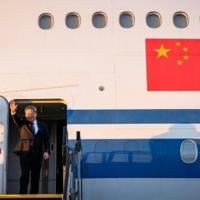Chinese Premier Li Qiang is celebrating a positive change in trade relations with Australia on Sunday by visiting a major wine-producing region that was previously impacted by Beijing’s sanctions.
As the highest-ranking Chinese official to visit Australia in seven years, Li’s four-day trip signals the potential for lucrative trade opportunities following Beijing lifting punitive measures against several Australian exports.
China remains Australia’s largest trading partner, accounting for nearly 30% of its exports last year, including key commodities like iron ore and coal.
In 2023, the two-way trade between the countries reached Aus$327 billion ($216 billion).
Upon his arrival in Adelaide on Saturday, Li stated that “Mutual respect, seeking common ground while shelving differences and mutually beneficial cooperation” are essential for the growth of China-Australia relations.
The premier highlighted Prime Minister Anthony Albanese’s efforts to mend fences during his visit to Beijing last November, emphasizing that “China-Australia relations were back on track after a period of twists and turns.”
Li is scheduled to visit winemakers in the renowned Barossa region near Adelaide, the hometown of Foreign Minister Penny Wong, who played a significant role in stabilizing relations with China.
In 2020, wine, coal, timber, barley, beef, and lobsters were among the Australian exports subjected to Chinese sanctions during a diplomatic dispute with the previous conservative government, costing Australian exporters an estimated Aus$20 billion ($13 billion) annually.
Following Albanese’s government taking office in 2022 and adopting a more diplomatic approach towards China, these sanctions have been gradually lifted.
While Li and Albanese are expected to discuss challenging issues such as foreign influence, human rights, Pacific rivalry, and alleged “unsafe” behavior by China’s military in closed-door talks in Canberra on Monday, the Chinese premier is primarily focusing on exploring economic opportunities during his visit.
– ‘Friendly country’ –
Melissa Conley Tyler, an honorary fellow at the University of Melbourne’s Asia Institute, noted that Li’s visit signifies a shift in perception, indicating that “Australia is back to being seen as a friendly country rather than the unfriendly, hostile country we were seen as during those years of maximum tension.”
To set a more positive diplomatic tone, Li will start his visit at Adelaide Zoo, home to giant pandas Wang Wang and Fu Ni on loan from China since 2009, symbols of China’s Panda diplomacy.
Despite not producing offspring during their time together, there are hopes that the pandas will be allowed to stay, as they have become integral to many Adelaide families.
Economic challenges remain due to the lingering impact of China’s trade measures, such as blocked premium Australian wine exports worth an estimated Aus$1 billion annually.
Australian wine producers are cautious about swiftly returning to pre-tariff trade levels with China even after the removal of tariffs, according to Paul Turale, marketing manager at Wine Australia.
While the rock lobster industry is still affected by Chinese sanctions, there is optimism that Li’s visit might lead to their removal as well.
Ahead of the visit, Business Council of Australia chief executive Bran Black emphasized the importance of growing export opportunities for Australia’s economic success, particularly given that over 20% of Australian jobs rely on trade.
“Australia’s trade with China will continue to be a priority, and we are pleased to see a continued stabilization of the relationship,” Black stated.
djw/mtp





